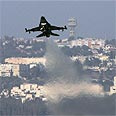
Israeli plane over Lebanon
צילום: איי פי
After war: Pressure to ban cluster bombs
Many voices of protest in Israel joined by protests abroad. British newspaper, Independent, reports that international protest organizations against mines pushing for international ban on cluster bombs following damage IDF cluster bombs caused in southern Lebanon
Anti-minefield international activists opened a head-on attack on Israel. The organizations pushing for an international ban on cluster bombs intensified their efforts when, according to them, the extent of the damage caused by the bombs in southern Lebanon became clear. This was reported Thursday morning in British-based newspaper, The Independent.
Anti-minefield campaigners accused the IDF of firing hundreds of cluster bombs at villages and fields in Lebanon, especially in the last three days of fighting. The bombs left behind, according to them, thousands of deadly duds in residential areas.
The bombs are intended to explode on impact, however, many fail to detonate, and are left as a dangerous, even fatal hazard to unsuspecting civilians returning to a bombed area.
According to UN numbers, since the end of fighting between Israel and Hizbullah in Lebanon, 12 people have been killed and 49 cluster bomb duds have detonated. UN officials warn that if a mine-clearance effort isn't put into action, the death toll is likely to rise.
'Bombs likely to detonate'
They recounted that in one incident this week, 35 duds were found in and around a residential home. In another incident, a woman lost her hands, apparently from a dud that exploded in the crops she was collecting in a field.
The Israeli government claims that it did not specifically target residential areas, and that every weapon used by the IDF is used in accordance with international law. However, campaigners are calling to forbid the use of cluster bombs under international law, claiming that the indiscriminate use of cluster bombs in populated areas is likely to contradict international law.
A mine-clearance specialist in southern Lebanon said that in the populated areas there is a large number of bombs that are likely to detonate if they are handled or moved.
Simon Conway, director of the British charity Landmine Action, condemned Israel's "cynical" use of the weapons. He said: "The premeditated targeting of residential areas with high failure-rate cluster munitions in the final days of the conflict means that the rubble-filled villages of southern Lebanon have been deliberately turned into minefields that will indiscriminately kill civilians for years to come."
Chris Clarke, head of the UN mine action service in southern Lebanon, estimated Wednesday in the international conference for conventional weapons in Geneva that it will take at least half a year to clear the "worst threat" bombs, and that "full clearance" of the field is likely to take more than a year.










